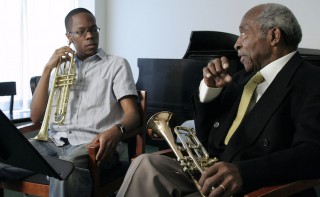Column Name
Title

Late faculty member Joe Wilder with one of his students, Brandon Lee (B.M. '05, M.M. '07, Artist Diploma '08, trumpet) in 2006.
(Photo by Peter Schaaf)Burnished. Warm. Elegant. Those words were frequently used to describe the style of legendary trumpeter and Juilliard faculty member Joe Wilder, who died on May 9. Those words also describe a consummate gentleman who broke racial barriers and inspired hundreds of musicians during his 92 years. Wilder, who had congestive heart failure, is survived by his wife, Solveig, three daughters, a son, and six grandchildren.
Body
Born in Colwyn, Pa., in 1922, Joseph Benjamin Wilder grew up in a musical family and was a regular performer on the radio by the age of 10. He aspired to a classical career, but there were no opportunities for black musicians, he later said. Wilder went on the road with Les Hite’s orchestra (he was first trumpet in a section that also included Dizzy Gillespie) shortly before graduating from a Philadelphia high school known for its music program. During World War II, he started in the marines special weapons division (he was one of the first black marines), but was soon recruited for the camp band. Throughout the 1950s and ’60s, he played for a who’s who of bandleaders—including Jimmie Lunceford, Gillespie, Count Basie, Hank Jones, Gil Evans, and Benny Goodman. Among the many vocalists who chose to perform with him were Billie Holiday, Lena Horne, Johnny Mathis, Harry Belafonte, and Tony Bennett. Wilder got his bachelor’s degree from Mannes in 1953 and periodically sat in with the New York Philharmonic in the 1960s. He was also principal trumpet for the Symphony of the New World.
Wilder was one of the first musicians to integrate Broadway pit bands and also one of the first to integrate studio bands of network radio and television. He was on the music staff of ABC from 1957 until the early 1970s, after which time networks got rid of their musical staffs.
“Everything that Joe went through isn’t readily apparent because he’s always so dignified and positive,” Wynton Marsalis (’81, trumpet), the new director of Juilliard Jazz Studies, wrote in the foreword to Softly, With Feeling, a biography of Wilder by Ed Berger that came out this past April.
While Wilder performed as a sideman for most of his career, in 2006, when he was 83, he had his first bandleading gig, at the Village Vanguard, and got rave reviews. In 2008, he was named a Jazz Master, the highest jazz honor bestowed by the National Endowment for the Arts.




